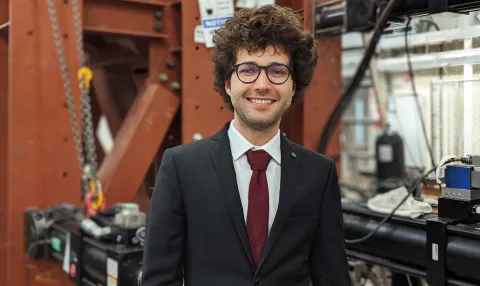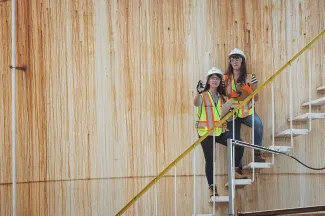"I find patience to be a great asset and, in research, it is the key to progress."

Ahmad Rahmzadeh
- Degree:
- Doctor of Philosophy
- Grad year: 2020
- Program:
- Campus: Okanagan
I am a PhD student in the Structural Engineering program at the UBC’s Okanagan campus. I obtained my bachelor's and master’s degrees in Iran and joined UBC Okanagan in September 2016, knowing there would be opportunities to satisfy my curiosity in research. For the past four years, I have been working on an innovative earthquake resistant bridge column. The journey has been fruitful so far, with lots of ups and downs that helped me develop a wide range of skills that I was lacking before.
Why did you choose to go into your field of study at UBC?
UBC was an obvious choice for me because of its global reputation in my research field and the close alignment of my interests with those of my supervisors’.
What has made your time at UBC memorable?
I had the opportunity to work as a teaching assistant for first-year engineering courses. Throughout this experience, I’ve been challenged by the undergraduate students’ curious minds, learned along and established good relationships with them. In particular, having my efforts appreciated by the students was very satisfying and memorable.
Tell us about your experience in your program. What have you learned that is most valuable?
Working in the Applied Laboratory for Advanced Materials & Structures was the turning point in my PhD studies. The amount of knowledge I gained through experiential learning in the lab was enormous and I could not have learned this much just by reading books and journal articles. Also, with the support of my supervisors, I have had the privilege of working in a collaborative environment in which several institutes and industrial partners are involved. This has led to an exceptional opportunity for me where I am able to interact with renowned researchers and practitioners in the field.
How are you applying the skills you learned through your studies at UBC?
The best skill I have developed throughout my PhD studies at university is the capability of doing several tasks simultaneously. In many cases, I’ve had to find a balance between my research workload, teaching responsibilities and extracurricular activities. I learned how to prioritize my work, allocate time efficiently and run tasks in parallel without compromising quality.
What advice would you give a student entering your degree program?
If you are pursuing a PhD degree, I believe you enjoy the subject of your program to the extent that you are willing to spend time and energy doing research and gaining in-depth knowledge on it. While doing research, there are challenges, moments of frustration and obstacles holding you back from achieving your goals. Ignore negative thoughts, be determined and relentless and keep pushing. Eventually, you will achieve what you were seeking, that is how it all works, and you will laugh at what you have been through.
Where do you find your inspiration?
Everyone; everyone is good at something, talented in a way. But in research, I would say my supervisors are the source of my inspiration. I am trying to learn how to be patient from them. I find patience to be a great asset and, in research, it is the key to progress.
What are your immediate and/or long-term plans for the future?
The research I am involved in is a long-term project. I am curious to see how the whole project works out and what the outcome is. So, my immediate plan is to continue working on it as a post-doctoral fellow.



